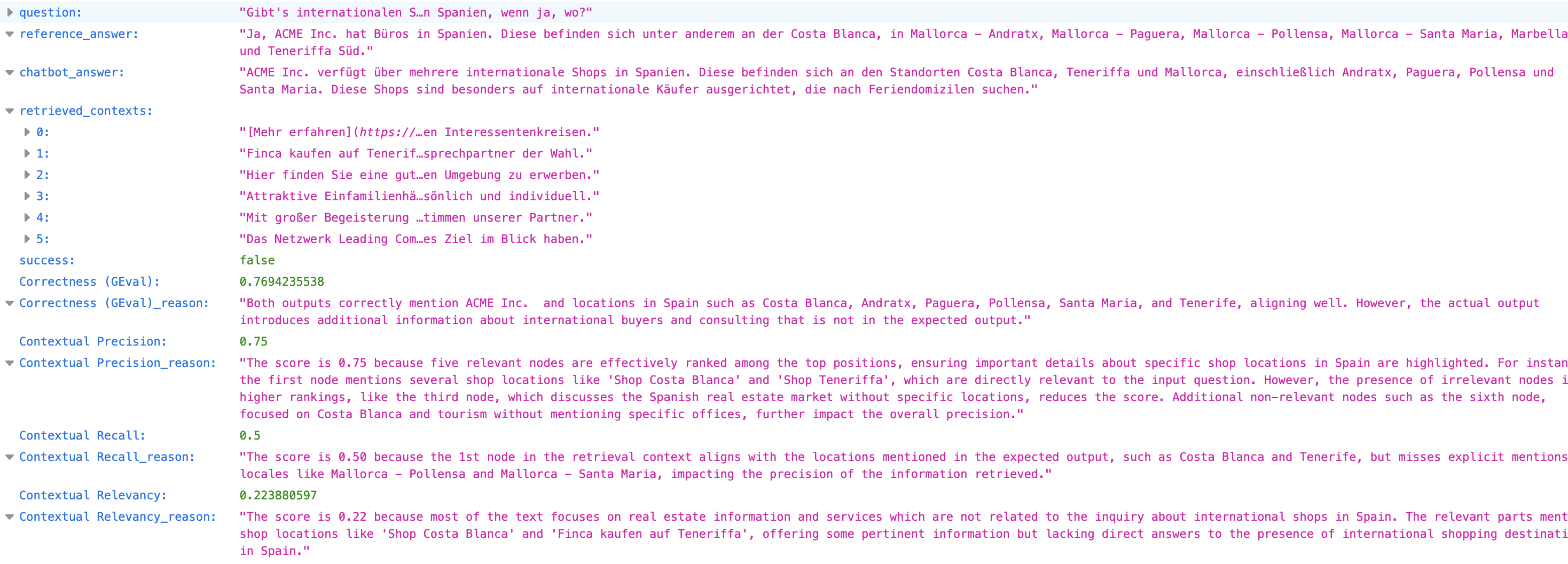Deepeval is a modern open-source framework for evaluating and monitoring language model (LLM) performance, with a particular focus on Retrieval-Augmented Generation (RAG) and general LLM output quality. It is designed to be easy to integrate, simple to use, and provides clear, actionable metrics out of the box.
Key Features
- Reference-Free Evaluation: Deepeval supports reference-free evaluation, enabling you to assess your RAG pipeline's quality even when ground-truth answers are not available. This is especially useful for real-world, production data.
- Metrics: Out of the box, Deepeval provides metrics such as faithfulness, answer relevancy, and context precision. You can also customize metrics and select different LLMs for evaluation. Embedding models may be used for generating synthetic data.
- Batch and Per-Trace Evaluation: Deepeval supports both per-trace (single request) and batch evaluation, allowing you to monitor individual outputs or analyze performance trends over time.
- Integration: Deepeval can be integrated into analytics or observability stacks for continuous monitoring of LLM and RAG performance. (If you use platforms like Langfuse, check for compatibility or roadmap updates.)
- Intuitive API and minimal configuration required
- Integrates with popular LLM frameworks (LangChain, LlamaIndex, etc.)
- Unit-Test Format: Allows you to write and execute evaluation test cases in a unit-test style, making it easy to integrate into CI/CD pipelines and development workflows.
- Thresholds for Metrics: Metrics can be accompanied by thresholds, enabling you to define clear pass/fail criteria for evaluations.
- Reasoning for Results: Evaluation results are supported by reasoning, providing transparency and actionable insights for each metric.
 Example: Deepeval output showing evaluation metrics and reasoning for a RAG pipeline.
Example: Deepeval output showing evaluation metrics and reasoning for a RAG pipeline.
Use Cases
- Evaluating RAG pipelines and LLM-based applications
- Monitoring LLM performance in production or development
- Rapid prototyping and experimentation with evaluation metrics
- Running both ad-hoc and scheduled (batch) evaluations
Integration
- Simple integration with Python-based LLM and RAG frameworks
- Works well as a drop-in replacement for Ragas in many scenarios
- Supports exporting results for further analysis
- Can be used in analytics/observability pipelines for ongoing monitoring
- Integrates with the commercial tool https://confident-ai.com, which is the evaluation and observability platform for deepEval
Team Insights
Our team has worked with both Ragas and Deepeval. In direct comparison, Deepeval is significantly easier to set up and use. The default configuration already provides meaningful, understandable results, and the documentation is much more reliable and complete than Ragas. For the features we require, Deepeval is the clear choice.
We have not encountered any major drawbacks in our use of Deepeval so far. For most standard evaluation needs, it is the more mature and user-friendly option.
Recommendation
We recommend Deepeval for most LLM and RAG evaluation scenarios. It is especially suitable for teams who want fast, reliable results without extensive configuration. Only consider alternatives like Ragas if you have highly specialized requirements that Deepeval cannot meet.